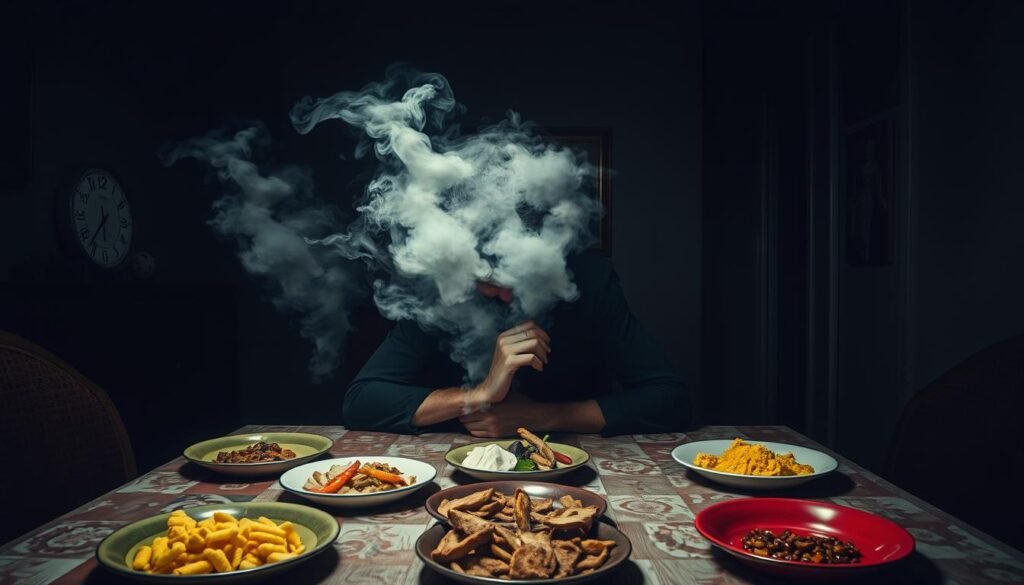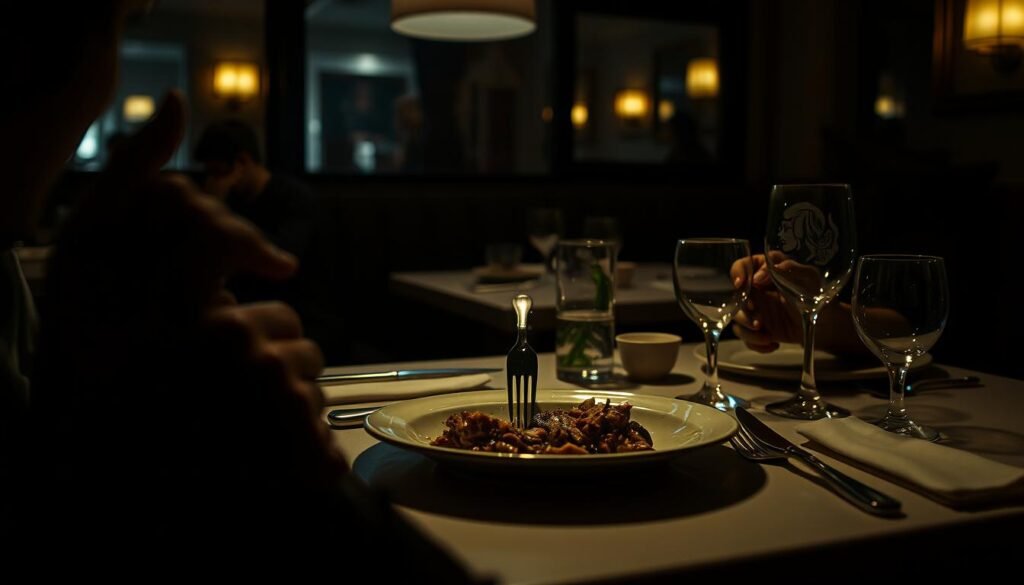About 20% of people in the US have food intolerance. This issue often causes discomfort after eating. Food anxiety is a big problem for many. Instead of feeling happy after a meal, they feel stressed. This makes enjoying food hard for them.
Eating should be a joy, not a source of anxiety. Yet, some get panic attacks after meals. Knowing why this happens and the symptoms is key. This knowledge helps people find ways to enjoy food again without worry.
Key Takeaways
- Approximately 20% of individuals have food intolerances that can lead to anxiety.
- Trigger foods often include trans fats, caffeine, and refined carbohydrates.
- Anxiety after eating can be exacerbated by conditions like reactive hypoglycemia.
- Methods such as talking therapy can alleviate food-related anxiety symptoms.
- Food journaling and developing relaxation techniques can help manage anxiety after meals.
- Fear of negative food reactions is common and can lead to restrictive eating habits.
Understanding Anxiety After Eating
Anxiety after eating shows up in different ways. People may feel an anxious stomach or fear something bad will happen. Many things cause this feeling. For example, a common issue is Gastroesophageal Reflux Disease (GERD). This problem can make your stomach hurt often and make anxiety worse after eating. Studies show treating GERD can help reduce anxiety.
Being around others when eating can also cause anxiety. About 15 million Americans have social anxiety, and eating out can trigger their symptoms. Avoiding social meals can make them feel more alone. This can make their anxiety get worse.
What we eat affects our anxiety. Eating too much salt, MSG, sugar, and refined carbs can make us feel more anxious. But eating foods high in fiber and low in glycemic index can help. They keep our blood sugar stable, which is good for our mental health.
Drinking alcohol and caffeine affects how anxious we feel. Alcohol can mess up our sleep and upset our nerves. Caffeine can make our hearts beat faster and make us feel more anxious. Cutting down on these can help with anxiety after meals.
Sometimes, anxiety after eating is linked to where and how we eat. Stressful places like crowded restaurants can increase anxiety. It’s important to know what makes us anxious. This helps us have a better time eating and enjoy our food more.
Common Symptoms of Anxiety Following Meals
After eating, people might feel various symptoms of anxiety. These show up in physical and emotional forms. Look out for muscle tension, rapid heartbeats, nausea, sweating, and a deep sense of dread.
- Muscle tension
- Rapid heart rate
- Nausea
- Sweating
- A profound sense of dread
It’s vital to see these symptoms as real health issues. Digestive anxiety can make eating far less enjoyable. For some, the symptoms become so intense that they stop eating, which harms their overall well-being. The root of post-prandial anxiety might be a fear of gaining weight or feeling discomfort. This fear can worsen anxiety and eating habits.
Studies show that anxiety and eating disorders often occur together. About two-thirds of people with eating disorders also deal with anxiety symptoms. This link shows we must address both mental and physical aspects of anxiety related to eating.

Five Main Reasons for Anxiety After Eating
Anxiety after eating can come from different causes. Understanding these can help people find out what triggers them. Here are five key reasons one might feel anxious after meals:
Uncomfortable Physical Sensations
Chest pain or heart palpitations can lead to anxiety after eating. This might be due to food intolerances that many people have. When the body struggles to digest certain foods, it can cause discomfort. This, in turn, can lead to feelings of unease and anxiety.
Anxiety and the Gut-Brain Connection
The gut-brain connection shows the link between mental health and digestive problems. Distress in the gut can alert the brain, increasing anxiety. This is why those with anxiety may have issues like bloating after eating.
Trigger Foods Associated with Anxiety
Some foods can trigger anxiety when eaten. Caffeine and sugar are common examples that might make someone’s heart rate go up. This can make them feel nervous. Certain foods can also bring back bad memories, increasing anxiety after eating.
Reactive Hypoglycemia
Reactive hypoglycemia happens when blood sugar levels fall quickly after a meal. It can cause symptoms like shakiness and irritability. This can lead to a cycle of anxiety, as the sudden loss of energy can cause panic. Eating differently can help ease these symptoms and reduce anxiety.
Trauma-Related Anxiety After Eating
Negative past experiences with food can link eating with anxiety. This includes things like food poisoning or upsetting events related to meals. These bad memories can make eating stressful rather than enjoyable.

Anxiety After Eating and Its Effects on Daily Life
Anxiety after eating can deeply impact daily life. It may lead to social barriers. Concerns about dining out or sharing meals can create fear.
Individuals might feel severe distress when choosing what to eat. This is due to fears of triggering their social anxiety.
Impact on Social Interactions
Social events with food can be challenging. Some avoid these gatherings, worried about their eating or others’ reactions. This leads to missing out on social connections.
Anxiety’s effects can make dining with peers a source of worry. Concerns about dietary choices and fear of judgment become significant.
Fear of Food and Its Consequences
Anxiety can cause fears towards certain foods. Every meal becomes a struggle. Those worried may skip foods that trigger their anxiety, leading to restrictive eating habits.
This can harm mental health. Yet, support systems help. Grouport Therapy is one such space for managing anxiety after eating.

| Consequences of Anxiety | Potential Health Issues |
|---|---|
| Social Withdrawal | Depression, Loneliness |
| Restrictive Eating | Eating Disorders |
| Fear of Judgment | Heightened Anxiety Levels |
| Increased Stress | Health Complications |
Ways to Reduce Food-Related Anxiety
Various methods can curb food-related anxiety. One effective way is using breathing exercises. They give quick relief and help calm your nervous system. This makes it easier to deal with situations that might cause anxiety. Adding breathing techniques to your daily routine helps build a peaceful state of mind, even in stress.
Breathing Exercises for Immediate Relief
Deep breathing exercises can really help reduce food anxiety. Try inhaling deeply through your nose and exhaling through your mouth. This technique grounds you and brings your focus to the current moment. Doing this simple action not only frees you from immediate anxiety but also sets a calm tone before eating or attending social events.
Seeking Help from Mental Health Professionals
Getting support from mental health experts is key for dealing with food anxiety. Therapy often involves methods like cognitive-behavioral techniques. These methods improve how you handle anxiety. Talking to a therapist offers a safe environment to uncover deeper issues and form a healthier view of food.
Food Journaling and Self-Compassion
Food journaling helps track your eating patterns and emotional reactions. It’s good for spotting what causes your anxiety. Plus, it teaches self-kindness, pushing away guilt about food choices. By being gentler with yourself, you can lessen food anxiety, leading to happier meal times.
The Role of Nutrition in Managing Anxiety
Nutrition and anxiety are closely linked. What we eat can really impact our mental health. For example, understanding food sensitivities and eating more probiotics can help manage anxiety. By choosing foods that make us feel better, we can ease anxiety symptoms.
Understanding Food Sensitivities
Food sensitivities can really affect how anxious we feel. Some foods can make anxiety worse. For many, foods like gluten or dairy can cause stress. Knowing which foods trouble you helps create a better diet. A good diet includes lots of fruits and vegetables. These foods support a healthy gut, reducing anxiety.
Incorporating Probiotics into Your Diet
Probiotics and mental health are an important focus now. When our gut bacteria are off, it can make us feel more anxious. Eating foods with probiotics, like yogurt or kefir, can help. These foods, along with prebiotic-rich garlic and onions, boost gut health. Better gut health can lead to better mental well-being.
| Dietary Component | Effect on Anxiety |
|---|---|
| Fruits and Vegetables | Less anxiety |
| Omega-3 Fatty Acids | Reduces anxiety symptoms |
| Processed Sugars | Increases anxiety levels |
| Probiotics | Support gut health |
| High-Fat Diets | Linked to higher anxiety |
When to Seek Professional Help
Recognizing anxiety is crucial. It’s the first step to manage it well. Those overwhelmed after eating may find daily life tough. Identifying if you need professional help for severe symptoms is key.
Identifying Severe Anxiety Symptoms
Symptoms of severe anxiety include:
- Avoidance of situations or people that trigger anxiety
- Significant changes in eating habits
- Chronic pain or gastrointestinal issues
- Feelings of panic, nervousness, or restlessness
- Trouble sleeping or poor overall quality of life
- Hyperventilation or an increased heart rate
- Shaking or excessive sweating
If symptoms keep up, getting help is a wise choice. Mental health services are there to help manage anxiety. They have different ways to help you cope.
Connecting with Support Groups
Support groups offer a safe space. They help those with similar struggles. Talking with others who get how you feel is helpful.
These groups let members share stories and ways to cope. This reduces the feeling of being alone. Being part of a community aids in recovery. You learn you’re not alone in this fight. Support groups are about healing together.
Resources for Managing Anxiety After Eating
Managing anxiety after eating can feel tough. But there are many resources to help you. You can find self-help books that talk about anxiety and emotional eating. These books offer good advice and ways to handle tough feelings.
Online communities are great for sharing stories. They help you feel connected and remind you that you’re not alone. It’s good to remember many people face the same struggles as you do.
Books and Online Support Groups
Self-help books really help with anxiety and emotional eating. They teach you a lot and show you helpful methods. Here are some great books to check out:
- The Emotional Eating Workbook by John D. McGary
- Intuitive Eating by Evelyn Tribole and Elyse Resch
- Mindful Eating by Jan Chozen Bays
Online groups give you a place to talk about your experiences. It’s inspiring to see others share their stories. You can find hope and strength from them. Check out these platforms:
- Facebook Groups about emotional eating
- Reddit communities like r/emotionaleating
- Websites like Eating Disorders Anonymous for support
Therapeutic Techniques and Practices
Using therapy methods can really reduce anxiety. Try meditation and yoga to relax and be more self-aware. Writing in a journal helps sort out your feelings about food and stress.
Cognitive behavior therapy (CBT) is especially helpful for emotional eating. Working with a therapist can improve how you handle difficult emotions. It can make coping easier.
In summary, books, online groups, and therapy help you deal with anxiety after eating. Using these resources makes facing challenges easier. They help you build strength to overcome anxiety.
Conclusion
It is very important to understand why some people feel anxious after eating. This problem involves symptoms after eating and also the reasons behind them. Sometimes, people feel nervous before meals, which can lead to feeling uneasy afterwards. This situation can make eating difficult and lead to unhealthy food habits. Knowing how food and anxiety are linked is key to addressing this issue.
Tackling this anxiety takes effort but can be managed. Keeping track of what you eat, practicing mindfulness, and talking about your feelings can help. These actions help figure out what triggers your anxiety and how to deal with it. This way, individuals can take steps towards overcoming their anxiety related to food.
For some, talking to a professional is a crucial step. Specialists can offer specific advice for dealing both with anxiety and its effects on life. To get more insight into handling anxiety after meals, check out this informative article.